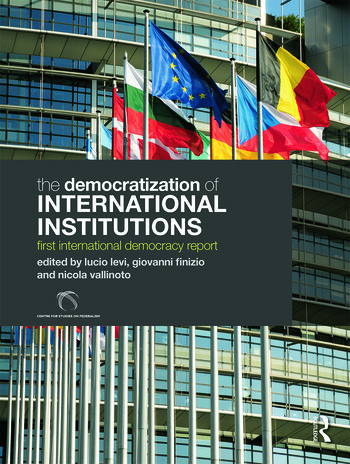The International Democracy Watch aims at developing an analytical framework to evaluate the democratic quality of IOs systematically. To this purpose, the political-institutional contents of democracy, traditionally studied and conceptualized at the nation-state level, must be adapted and applied to international relations.
This theoretical adaptation is first of all expressed though a set of qualitative macro-indicators, developed by IDW as guidelines for its researchers in monitoring and assessing the democratization of international organizations.
An additional set of quantitative micro-indicators, composing the International Democracy Index (IDI), will express the dimensions of international democracy ant quantify the democratic quality of international organizations.
Both qualitative and quantitaive results of the assessment will be published, in different forms, on this website and on the International Democracy Report, edited biennially.
We hope that the combined exploitation of these tools can assist the scientific community in studying two processes which are taking place in parallel, pushed further by globalization, but not at the same speed: the international organization on the one hand, and its gradual democratization on the other (for example, comparing different experiences and their democratization over space and time).
The International Democracy macro indicators
The monitoring and the assessment of international organizations' democratization will be based on ten qualitative macro-indicators:
The International Democracy Index
The International Democracy Index will be the tool to rate and rank the monitored organizations.
It will be calculated from a set of indicators divided into different categories such as representative, participatory, paritary, social, cultural, electoral, cosmopolitan and information democracy.
A yes/no score (1,0) will be assigned to each indicator; whenever an indicator will produce an interpretation problem a value of 0.5 will be used. The final score will be translated into a 1 to 100 scale. A scoring of 100 points represents the ideal situation of a supranational institution where international democracy is fully implemented in each of its elements.
The quantitative indicators composing the International Democracy Index are still under construction, and will be ready very soon.
Table of Contents
PART I
1. Preface - Giovanni Finizio, Lucio Levi and Nicola Vallinoto
2. Introduction - Lucio Levi
3. The Legal and Political Status of International Parliamentary Institutions - Claudia Kissling
PART II - Universal Organisations
4. United Nations - Giovanni Finizio
5. World Bank - Tina M. Zappile
6. International Monetary Fund - Jonathan R. Strand
7. World Trade Organization - Alexia Herwig
8. International Labour Organization - Jill Jensen
9. Inter-Parliamentary Union - Claudia Kissling
PART III - Regional Organisations
Europe
10. The Democratisation of the European Union: Historical and Theoretical Aspects - Mario Telò
Box 1. Benelux
11. European Union: the Process Towards Supranationality - Lucia Serena Rossi
Box 2. Central European Iniziative
12. The Democratisation of the European Union - Dawid Friedrich
Box 3. Nordic Council
Africa
13. African Union (AU) - Stephen S. Kingah
14. Economic Community of West African States (ECOWAS) - Hélene Gandois
15. West African Economic and Monetary Union (WAEMU) - Kama Tapè Berengér
16. Economic Community of Central African States (ECCAS) - Angela Meyer
17. Central African Economic and Monetary Community (CAEMC) - Angela Meyer
18. East African Community (EAC) - Korwa G. Adar
19. Southern African Development Community (SADC) - Andreas Godsäter
Box 4. Arab Maghreb Union
America
20. South American Common Market (MERCOSUR) - Mariana Luna Pont
21. Andean Community (CAN) - Dayanna Sanchez Rodriguez
22. Union of South American Nations (UNASUR) - Nicolas Comini
23. Central American Integration System (SICA) - Giannis Papageorgiou
24. Caribbean Community (CARICOM) - Tamara Brown-Onnis
25. North American Free Trade Agreement (NAFTA) - Jordan Bankhead
Asia and Oceania
26. Association of South-East Asian Nations (ASEAN) - Herman Joseph S. Kraft
27. South Asian Association for Regional Cooperation (SAARC) - Deepshikha Shahi
28. Gulf Cooperation Council (GCC) - Jordan Bankhead
29. Pacific Islands Forum (PIF) - Chris Hamer
PART IV - Interregional Organisations
30. Council of Europe (CoE) - Kundai M. Sithole
Box 5. Arctic Council
31. EU/ACP Partnership - Andrea Cofelice
Box 6. International Organization of La Francophonie
32. League of Arab States (LAS) - Nadine Mourad Sika
Box 7. Council of Baltic Sea States
33. North Atlantic Treaty Organization (NATO) - Marek Madej
Box 8. Organisation of Black Sea Economic Co-operation
34. Organization of American States (OAS) - Marcos Aurélio Guedes de Oliveira
Box 9. Organization of Islamic Cooperation
35. Organization for Security and Cooperation in Europe (OSCE) - Julinda Beqiraj
36. Commonwealth of Independent States (CIS) and Eurasian Economic Community (EurAsEC) - Alexander Libman
PART V
37. Autonomous Interparliamentary Assemblies Edited by Laura Roscio
Amazonian Parliament
Asia-Pacific Parliamentary Forum
Association of Senates, Shoora and Equivalent Councils in Africa and the Arab World
Baltic Assembly
Central European Initiative
Indigenous Parliament of America
Inter-Parliamentary Assembly on Orthodoxy
Inter-Parliamentary Forum of the Americas
Parliamentary Assembly of the Mediterranean
Parliamentary Confederation of the Americas
PART VI
38. Civil Society Movements and Campaigns for International Democracy - Nicola Vallinoto





